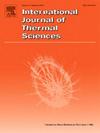智能混合动力热管理:连接可持续电动汽车和混合动力汽车的创新
IF 5
2区 工程技术
Q1 ENGINEERING, MECHANICAL
International Journal of Thermal Sciences
Pub Date : 2025-05-22
DOI:10.1016/j.ijthermalsci.2025.110013
引用次数: 0
摘要
对电动和混合动力汽车(EHV)日益增长的需求需要能够提高电池性能、寿命和安全性的新技术。有效的热管理是影响这些参数的重要因素。通过结合相变材料(PCMs)、液体和空气冷却机制、热管(HP)和热电冷却器(tec),这些系统实现了卓越的热调节,从而最大限度地降低了温度梯度,提高了系统对波动热负荷的适应性。这项研究描述了一种新的智能混合热管理系统(S-HTMS),可以优化未来超高压汽车中电池组的热管理。建议的混合策略结合了液体冷却和空气基或相变材料(PCM)系统,以利用被动和主动冷却策略。本文结合了HBTMS的最新进展,包括纳米材料增强的PCMs,自适应控制技术和高效热交换器,所有这些都有助于最大化能量传递并实现实时热响应。本文还概述了控制下一代BTMS进步的效率、成本和设计方面的关键权衡,这对于高性能EV和HEV应用至关重要。本文提出的见解旨在为电池系统的设计建立一个基础框架,该框架不仅安全高效,而且具有可持续性,从而为EV和HEV技术提高效率和可靠性做出贡献。本文章由计算机程序翻译,如有差异,请以英文原文为准。
Smart hybrid thermal management: Bridging innovation for sustainable electric and hybrid vehicles
The growing need for electric and hybrid vehicles (EHV) requires new technologies that can enhance battery performance, longevity, and safety. Efficient thermal management is an important factor that influences these parameters. Through the incorporation of phase change materials (PCMs), liquid and air cooling mechanisms, heat pipes (HP), and thermoelectric coolers (TECs), these systems attain exceptional thermal regulation, thereby minimizing temperature gradients and improving system adaptability in response to fluctuating thermal loads. This research describes a new Smart Hybrid Thermal Management System (S-HTMS) that optimizes the thermal management of battery packs in future EHVs. The suggested hybrid strategy combines liquid cooling and air-based or phase change material (PCM) systems to take benefit of both passive and active cooling strategies. The present article combines recent advances in HBTMS, including nanomaterial-enhanced PCMs, adaptive control techniques, and high-efficiency heat exchangers, all of which serve to maximize energy transfer and enable real-time thermal response. This review additionally outlines critical trade-offs in efficiency, cost, and design which govern the advancement of next-generation BTMS, which are vital for high-performance EV and HEV applications. The insights presented herein intend to establish a foundational framework for the design of battery systems that are not only safe and efficient but also sustainable, thereby contributing to the EV and HEV technology towards enhanced efficiency and reliability.
求助全文
通过发布文献求助,成功后即可免费获取论文全文。
去求助
来源期刊

International Journal of Thermal Sciences
工程技术-工程:机械
CiteScore
8.10
自引率
11.10%
发文量
531
审稿时长
55 days
期刊介绍:
The International Journal of Thermal Sciences is a journal devoted to the publication of fundamental studies on the physics of transfer processes in general, with an emphasis on thermal aspects and also applied research on various processes, energy systems and the environment. Articles are published in English and French, and are subject to peer review.
The fundamental subjects considered within the scope of the journal are:
* Heat and relevant mass transfer at all scales (nano, micro and macro) and in all types of material (heterogeneous, composites, biological,...) and fluid flow
* Forced, natural or mixed convection in reactive or non-reactive media
* Single or multi–phase fluid flow with or without phase change
* Near–and far–field radiative heat transfer
* Combined modes of heat transfer in complex systems (for example, plasmas, biological, geological,...)
* Multiscale modelling
The applied research topics include:
* Heat exchangers, heat pipes, cooling processes
* Transport phenomena taking place in industrial processes (chemical, food and agricultural, metallurgical, space and aeronautical, automobile industries)
* Nano–and micro–technology for energy, space, biosystems and devices
* Heat transport analysis in advanced systems
* Impact of energy–related processes on environment, and emerging energy systems
The study of thermophysical properties of materials and fluids, thermal measurement techniques, inverse methods, and the developments of experimental methods are within the scope of the International Journal of Thermal Sciences which also covers the modelling, and numerical methods applied to thermal transfer.
 求助内容:
求助内容: 应助结果提醒方式:
应助结果提醒方式:


